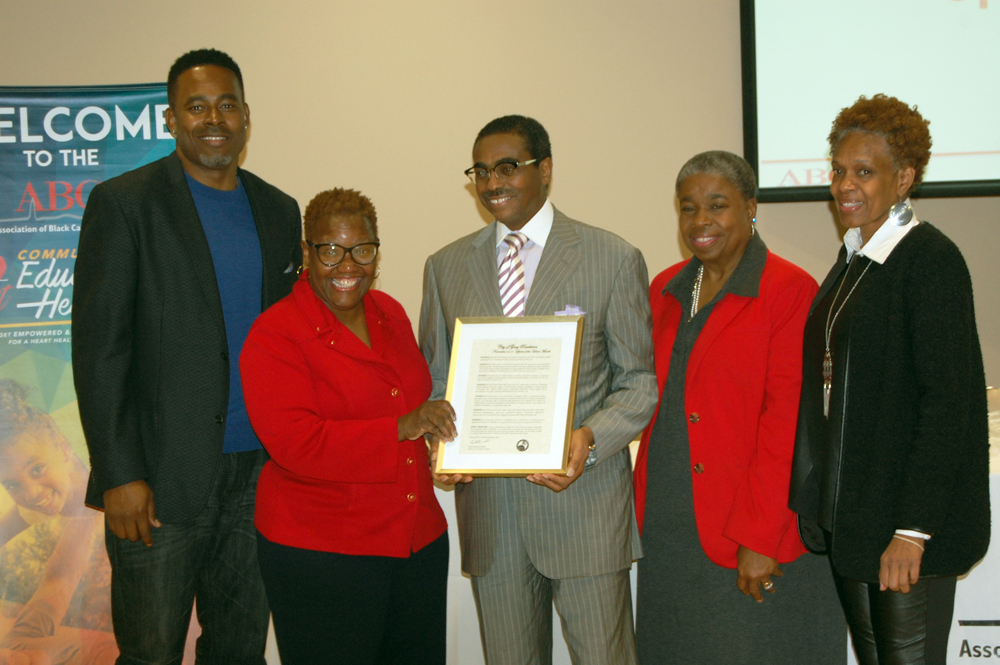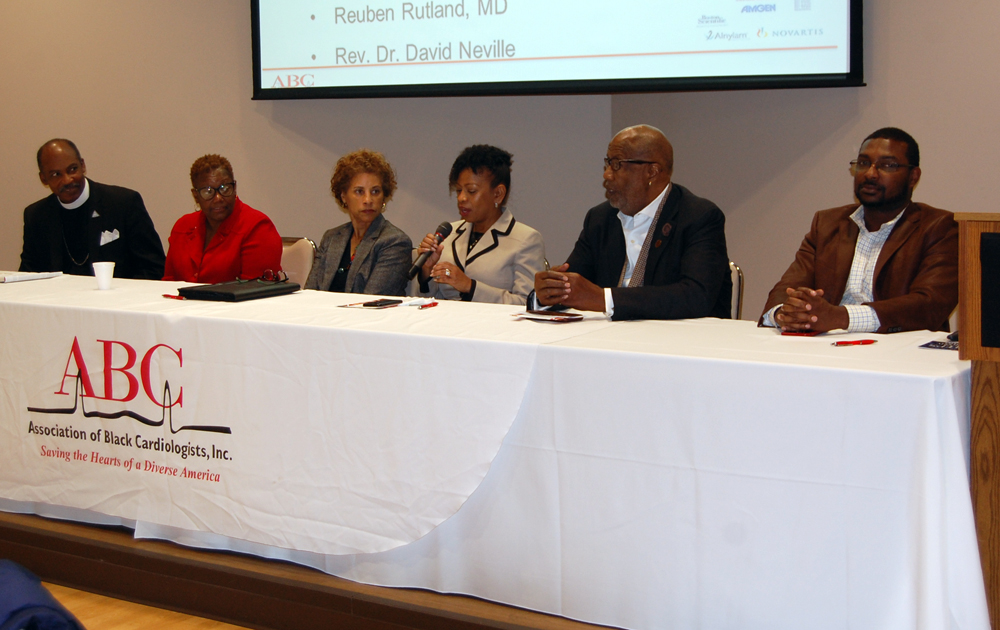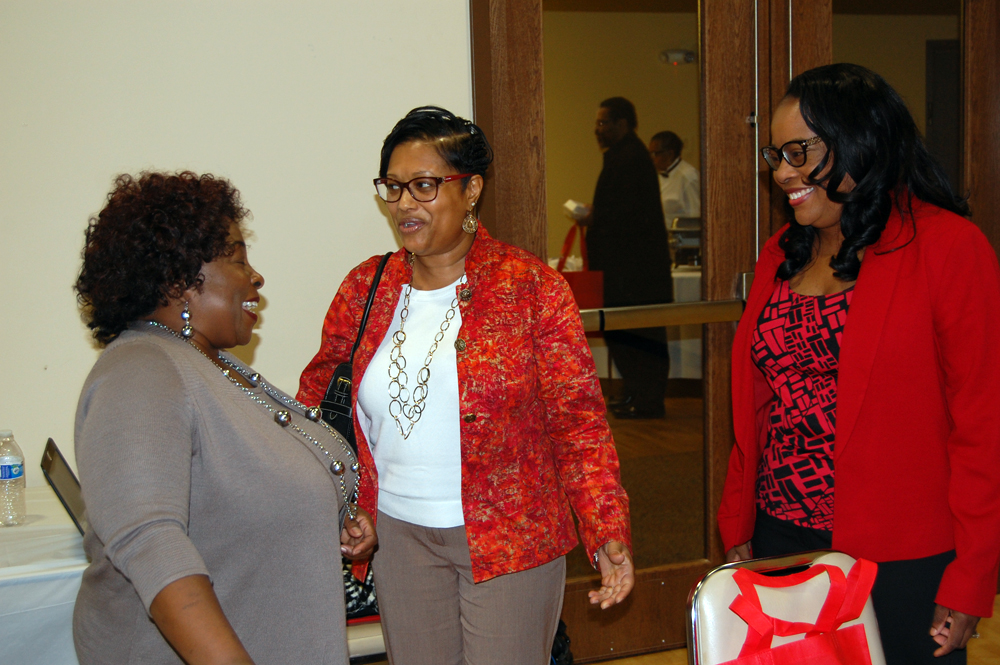
ABC spokesman Lamman Rucker, Mayor Karen Freeman-Wilson, Dr. Andre Artis, Denise Dillard, Methodist Hospitals, and Yvette Lee, ABC
Heart health education for the healed and the healers
Contributed By:The 411 News
Association of Black Cardiologists talks heart disease to group with highest rates
A two-day health fair is unusual and one that is directed at the healer as well as the healed is even more so. Methodist Hospitals and the Association of Black Cardiologists brought the subject of heart health to a portion of the U.S. that has the highest incidences of heart disease.
Black Americans’ high rate of heart disease has led to higher rates of hospitalization, disability and premature death than in the rest of the country’s population.
Day one at St. Timothy Community Church in Gary, host site of ABC’s Spirit of the Heart Health Fair, was an invitation to healthcare, educators, business, and community leaders to look at heart disease in their community, its leading causes of hypertension or high blood pressure and diabetes, and what can be done about it.
ABC member and Methodist physician Dr. Andre Artis, Medical Director of the Heart and Vascular Institute at Methodist Hospitals, said the two-day health fair is held in several U.S. cities each year. The program was developed to help the public understand that heart disease is preventable and heart healthy practices are important for longevity. “We want every grandchild to know his grandparents.”
The Association advocates for healthy lifestyles – including proper diet and exercise – which can diminish the risks of heart disease. Dr. Artis reminded Friday’s attendees, “You have to take care of yourself before you can take care of someone else. Don’t just focus on blood pressure; there are also cholesterol levels, weight, body mass index (BMI), and to consider if they’re counseling a female or a male.” Black women have the highest overall mortality rate from heart disease.
Another dimension of the Spirit of the Heart program examines access to health care in black communities for treating heart disease. Dr. Artis’ map showing estimates of the makeup of the U.S. population by 2050 will be more than 50 percent minorities “means blacks and other people of color have to be included in conversations on health care.”
The Association advocates for minorities inclusion in clinical trials. Black participation in those medical therapies studies is low, Artis said, because of the rebuke and backlash to the historic Tuskegee syphilis study.
He pointed to a successful clinical trial, the A-HeFT (African American Heart Failure Trial) that Gary residents took part in during the 1990s that proved better drug treatments for African Americans with high blood pressure and heart disease. Artis said clinical trials are important and urged his audience to take part in them “because this is where new treatments are discovered that can help you and those in the future.”
The association also works to improve access to health care by helping physicians and their patients gain prior authorization approval from insurance companies.
Neicy Johnson is an ABC member and a clinical attorney who monitors pharmaceutical and medical device companies for regulatory compliance.
Johnson cited instances of ABC’s involvement that alerted the FDA (Federal Drug Administration) to noncompliance by those companies. “ABC found that a heart valve replacement trial, the TAVR study, was not being offered to African Americans. In another instance, ABC found that an insurance company would not approve payment for a medication to African Americans that it approved for its white enrollees.”
During a panel discussion, Community HealthNet’s Dr. Janet Seabrook told of her participation in the A-HeFT trial. She was in the Family Medicine Residency Training Program at Methodist Hospitals and collected data from patients for the study. “Something we can do to help our community is bring back the graduate medical program. When you have the structure in place, you can have more clinical trials. We have a great university and 4-year medical school sitting right on 34th and Jefferson in Gary, Indiana.”
Panel member State Rep. Charlie Brown said legislation had been created several years ago to fund graduate medical programs in several counties across the state. Brown put the question to Indiana University’s Dr. Patrick Bankston, who was in the audience, “Where are we here in Lake County with establishing a graduate medical program?”
Bankston said a regional health consortium of hospitals and health centers in Lake, Porter, and LaPorte counties had a feasibility study done on establishing a medical residency program at IU Northwest and “it showed all hospitals could do it with minimal costs.” Bankston said the state has designated $500,000 for the IU program. “Now we’re waiting on the hospitals to make the commitment to support the consortium.”
Day two of the health fair was for the public. Available were free lab tests for Glucose, HDL, LDL, Cholesterol and PSA for men. Free flu shots, HIV testing and heart and stroke risk assessments were also offered. Health education included CPR and Stop the Bleed demonstrations, Ask a Pharmacist, Breast Care information, and Diabetes education.

Heart Health Panel: Rev. Dr. David Neville, Methodist Hospitals (l-r), Mayor Karen Freeman-Wilson, Atty. Myra Selby, Dr. Janet Seabrook, State Rep. Charlie Brown, and Dr. Reuben Rutland, Methodist Hospitals

Rosalyn Whitfield (l-r), representing Meals On Wheels of Central Indiana; Quanda Davis, representing Alpha Kappa Alpha Sorority; and Tammy Morris, representing The Aliveness Project of NWI
Story Posted:11/13/2018
|